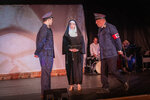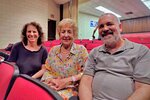A former Springside teacher survived the Holocaust thanks to courageous individuals.
This item is available in full to subscribers.
You can also purchase this individual item for $1.50
We have recently launched a new and improved website. To continue reading, you will need to either log into your subscriber account, or purchase a new subscription.
If you are a digital subscriber with an active subscription, then you already have an account here. Just reset your password if you've not yet logged in to your account on this new site.
If you are a current print subscriber, you can set up a free website account by clicking here.
Otherwise, click here to view your options for subscribing.
Please log in to continue |


Ruth Kapp Hartz, a former teacher at what is now Springside Chestnut Hill Academy, survived the Holocaust thanks to courageous individuals in southern France who sheltered her family while putting their own lives at great risk.
It is a story so harrowing and remarkable that it inspired Stacy Cretzmeyer, Hartz’s former student, to collaborate with the retired teacher on the 1999 memoir, “Your Name is Renée: Ruth Kapp Hartz's Story as a Hidden Child in Nazi-Occupied France.”
Now, decades after a young Hartz was shielded by nuns in a convent, lost many in her family to the Nazi rampage and was eventually reunited with her family, a new reflection on the Holocaust survivor’s life has opened on a theater stage.
The show “Hidden: A Musical” was performed Sept. 6 and 7 at Gratz College Theater, 7605 Old York Rd. in Elkins Park. It will be performed again on Sept. 20, 8 p.m., and Sept. 21 and 22, both at 2 p.m.
“I get very emotional when I see the play,” Hartz said, “seeing my life come to life (on stage) at my age.” Hartz, who was called Renee during the years surrounding the war to help hide her Jewish identity, is 86.
The show is the work of Jenny and David Heitler-Klevans, who lived in Mt. Airy for 11 years before moving to Cheltenham in 2001. The husband-and-wife collaborators have been composing and performing music for 34 years under the name “Two of a Kind.” They happened to meet Hartz through David's mother, who was also a French teacher, and in 2016, the couple proposed the idea for a show.
“Ruth's story really moved us,” David Heitler-Klevans told us last week, “and we were inspired by the people who risked their lives to save Ruth and her parents during World War II. The themes of her story resonated with what's been happening recently in this country, especially with the rise of antisemitism, racism, xenophobia, anti-LGBTQ+ and fascist leaders. We have had extremely positive reactions from audiences so far to 'Hidden.' People have told us that they find the musical very moving, powerful and effective.”
To develop the show, Jenny and David Heitler-Klevans met with Hartz in France to start work on the production. Hartz has returned to the country many times to visit the people who rescued her. She, along with the Heitler-Klevanses, visited the convent where a young Hartz was left by her family to be hidden, believing the youngster would have a greater chance at survival there than to be on the run. When Hartz returned to France with the composers, they interviewed the Holocaust survivor’s last living rescuer. The couple continued to work on the musical during the pandemic, writing the score and assembling a cast.
“I am so honored,” Hartz said about the production. “On opening night, there were about 200 people, and they loved it.”
After the war, Hartz's life continued its extraordinary trajectory. Miraculously reunited, Hartz and her family moved to Paris. She attended the Sorbonne University, earning a degree in biochemistry. In 1958, she emigrated to the U.S. and married Harry Hartz, a chemical engineer that Ruth Hartz described as a “Renaissance man.”
She took a job doing research in baby formula for Wyeth Laboratories, but when she started a family with two children, she left the job to become a stay-at-home mother. A decade later, when her children were old enough to be somewhat self-sufficient, she took the teaching job at Springside School.
After 50 years of marriage, Harry passed away. For the past 15 years, Ruth has lived in Jenkintown with a widower, Barry Zimmerman, “a wonderful man” who is also an engineer.
Hartz, who considers herself a full-time Holocaust educator, has for years been actively involved with Holocaust organizations and regularly visits schools and other institutions to tell her survival and rescue story.
In March of this year, Hartz returned to Springside Chestnut Hill Academy to talk to 10th-grade students about her early life as a “hidden child” in Nazi-occupied France. She explained that at the start of the war, instead of wearing the yellow six-pointed “Jewish star” that Jews were forced to wear, 4-year-old Hartz and her family went into hiding in Arthès, France, with fake documentation. Her cousin gave her a new name, Renée, which, she noted for the student audience, is French for “reborn.”
“Only 6 percent of European children survived,” she said, “and most, like me, were ‘hidden children’ because others were immediately put to death … You are the last generation to hear our stories. You are our voices to tell our history to future generations.”
For ticket information to “Hidden,” visit our.show/hidden. There is a discount for groups of 10 or more. Len Lear can be reached at lenlear@chestnuthilllocal.com. WHYY contributed to this report.